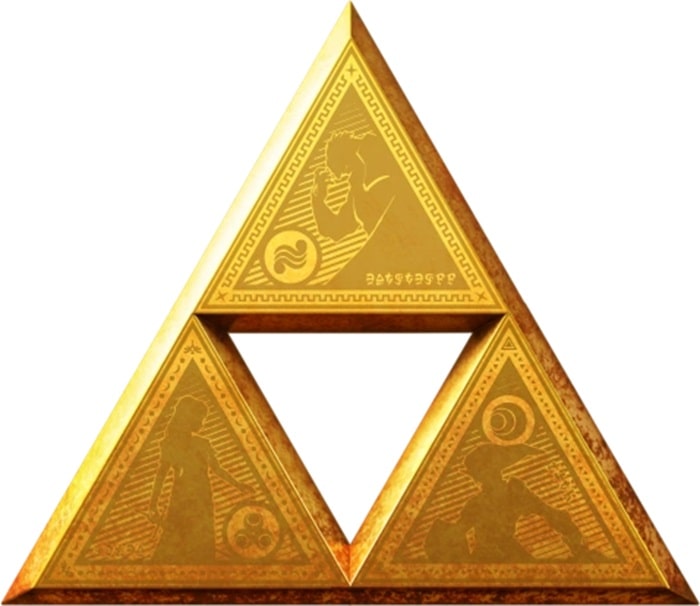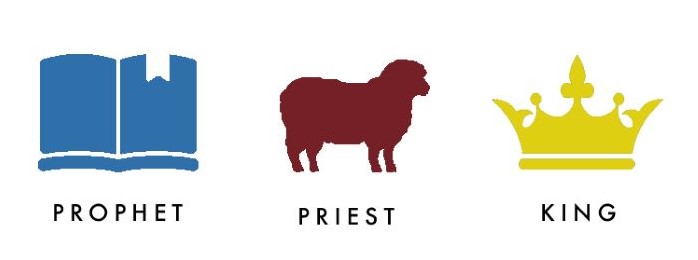The unstated job requirements of being a data scientist
This is the Triforce.

In the Legend of Zelda franchise, these three triangular artifacts represent the virtues of courage, wisdom, and power. They are the ultimate force in their in-game universe, as they represent the essence of the creator goddesses and can grant any wish to those who wield it.
This is the threefold office:

In Christian theology, these are the three roles that Jesus Christ played as the Messiah. Indeed the term "messiah" means "anointed one", and in the Old Testament, people were inducted into the office of prophet, priest, or king by anointing them with oil.
And this post is about the job requirements of being a data scientist. What do these things have to do with one another?
It is easy enough to figure out the usual qualifications to be a data scientist. You need some programming skills, some data processing ability, knowledge of statistics and machine learning, and good communication skills. But I believe that a crucial, unstated job requirement for being a data scientist is to be courageous. Indeed with the advent of AI, it may be that the possession of such moral virtues becomes ever more important, as our technical skills become supplemented by AI.
Of course, courage, wisdom, and power are needed in different degrees by everyone, not just data scientists. Anyone with any kind of leadership or authority is some parts prophet, priest, and king. But among the three roles, data scientists - and knowledge workers in general - are most like the prophets of old. And naturally, courage is their requisite primary virtue.
Why courage? Well, many prophets faced great hardship for speaking God's word to people who did not want to hear them. But I think a modern example best illustrates the point. Consider the the 2007-2008 financial crisis. This was the worst economic downturn since the Great Depression, and it was caused, in part, due to the lack of courage on the part of the analysts. This is obviously an oversimplification of a multifaceted problem, but some mortgage analysts, somewhere, should have said "I don't think we should make this loan".
Undoubtedly some analysts did say that - but what happened to them? They would have been told, "it's the industry standard", "the CEO wants it done this way", "everyone else is doing it", "you're losing us money", "get with the program". In this way they would have been cowed, and those that insisted would have been sidelined or fired.
I am of course not saying that every analyst in the financial crisis was a coward, or that they alone were responsible for the great recession. I am merely pointing out the nature of the forces that were arrayed against them - how their courage was tested. The analysts that passed this test would have saved themselves and their clients. Enough of them in one firm would have protected that firm to some degree. More of them in our society would have mitigated the worst effects of the crisis. And who knows - if enough people were brave enough, we might have avoided the crisis altogether.
This is why courage is necessary for knowledge workers. Nor is this story a cherry-picked example: in general, you're a knowledge worker because someone wants some information from you. Inevitably, some of this information will be considered "good news", and others "bad news". For instance, when a data scientist reports on the results of an A/B test, everyone wants the treatment to work. The company would make money, everyone's work would be validated, and their careers would be further advanced. On the other hand, "bad news" would mean that engineers would have to scrap their work, the designers would have to go back to the drawing board, and the product would have lost out on a chance at improvement.
Thus the natural incentives of the whole team are all arrayed against you giving the "bad news". Nevertheless, their job is to accept whatever the results may be in an unbiased manner - and your job is to deliver those results forthrightly, REGARDLESS of what they are, and REGARDLESS of the attitudes of your team. This again requires courage.
This is not a new observation. It's been said before that "the society that separates its scholars from its warriors will have its thinking done by cowards and its fighting by fools". And this perhaps points to a gap in our modern world in the training of our knowledge workers, where we do in fact largely separate our scholars from our warriors. Nor are the academic subjects in the technical training of a data scientist particularly conducive to the development of courage: at the level of a student, subjects like math, science, and programming can be learned by dutiful obedience to your instructor, and doing exercises that have definitive answers - with no independence, exploration, or risk-taking required.
Alarmingly, all this applies to me: I was mostly a good, well-behaved student. I don't have any military experience. I don't know what I would have done in the 2008 financial crisis, which was before my time. And this probably applies to many other data scientists, too. But I think this is all the more reason to draw our attention explicitly to the necessity of courage, which is what I'm trying to do here.
So, courage is the primary virtue. It's what we need to faithfully tell the truth. But this doesn't mean that we are to be abrasive or pugnacious. Our primary role as knowledge workers is greatly assisted by a little bit of wisdom, by taking on a bit of the role of priest. There is a great deal to say here, on the art of telling hard truths to people in a way that honors both the truth and the people. But for now, I will merely say that it's good to learn to say "no", and better still to say "no" in various degrees. You can disagree with someone, or deliver bad news to them, by saying anything from "no, but I found three other ways to still get us what we want", to "no, and I'll quit if we go ahead with this plan". I've never had to go anywhere near the latter option, because there are dozens of shades of "no" between the two extremes, to be used judiciously as the situation demands.
What about "power"? Should data scientists seek the office of "king"? As I've said, all three components are necessary for everyone to some degree. Data scientists need enough executive power to do their jobs smoothly. But in general, I would warn anyone against going after all three components at once. In the Legend of Zelda franchise, few have ever wielded the full Triforce. In real life, there is only one Christ, one Messiah who is prophet, priest, and king. Ordinary humans that seek such totality in their leadership only end up as tyrants, and this is probably the reason that the roles are separate.
So overall, that is how I understand what it means to be a data scientist, or any kind of knowledge worker. It's primarily to be a "prophet", with some "priest" mixed in, with a dash of "king" as needed. It's first to have courage, tempered with with wisdom, and sufficient power to fulfill our role.
It may be strange to think of a job like data science in terms of moral virtues, or Old Testament offices. But remember, as data scientists, you ultimately have a moral duty to the Truth. Be strong and courageous, for if you do your job well and stand in the Truth, everything above about all three components above will be with you wherever you go.
You may next want to read:
Leave a Reply
You must be logged in to post a comment.
Post Importance
Post Category
• humanities (23)
• current events (27)
• fiction (10)
• history (33)
• pop culture (13)
• frozen (8)
• math (57)
• personal update (19)
• logic (65)
• science (56)
• computing (16)
• theology (101)
• bible (39)
• christology (10)
• gospel (7)
• morality (18)
• uncategorized (2)